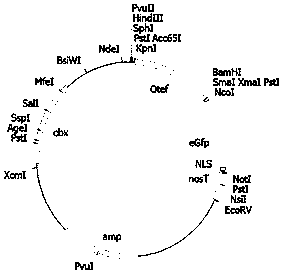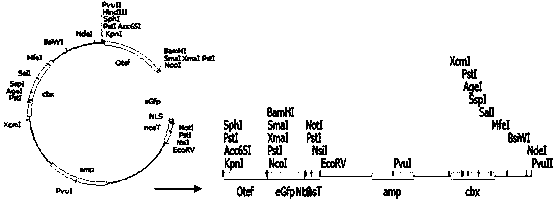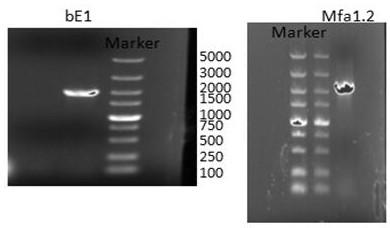Ustilago esculenta haploid strain UeTSP and application thereof
A haploid and bacterial strain technology, applied in the fields of application, fungi, biochemical equipment and methods, etc., can solve problems such as the trouble of artificial fertilization
- Summary
- Abstract
- Description
- Claims
- Application Information
AI Technical Summary
Problems solved by technology
Method used
Image
Examples
example 1
[0024] Example 1: Extraction of Genomic DNA in Ustilago smut UET1 Strain
[0025] 1. Heat the CTAB extract in a water bath at 65°C half an hour in advance.
[0026] 2. Take UET14 bacteria (thickness about 5mm) into a 2.0mL centrifuge tube with a pipette tip, add about 10 stainless steel balls (diameter 1mm), and mark. In the fume hood, add 800ul preheated CTAB extraction solution. The vibrating instrument is 70Hz, vibrate for 150s, and break up the bacteria.
[0027] 3. Water bath at 65°C for 1 hour.
[0028] 4. Add an equal volume of phenol: chloroform: isoamyl alcohol (25:24:1), and mix well.
[0029] 5. In the fume hood, let stand at room temperature for 15 minutes. Centrifuge at 10000rpm for 10min at room temperature. At this time, stratification occurs in the centrifuge tube. The supernatant contains nucleic acid, the middle is a protein layer, and the bottom is steel balls and impurities. Carefully pipette the supernatant into a new 1.5mL centrifuge tube (steps 4 a...
example 2
[0035] Example 2: mfa1.2 gene cloning
[0036] Using the genomic DNA in the UET1 bacterial strain obtained in Example 1 as a template, according to the designed mfa1.2F and mfa1.2R primers, clone mfa1.2 Gene. The nucleotide sequence of mfa1.2F is shown in SEQ ID No.1, and the nucleotide sequence of mfa1.2R is shown in SEQ ID No.2.
[0037] PCR amplification system: (50 ul)
[0038] 10×PCR buffer (takara) 5ul
[0039] dNTP mix (takara) 4ul
[0040] mfa1.2F 1ul
[0041] mfa1.2R 1ul
[0042] LATaq (takara) 0.5ul
[0043] dd H2O 37.5ul
[0044] UET1 DNA 1ul
[0045] The PCR reaction conditions are as follows:
[0046]
[0047] PCR products were detected by 1% agarose gel electrophoresis. After cutting the gel, the product was recovered with the Magen Gel DNA Mini Recovery Kit. Store in a -20°C refrigerator for later use.
example 3
[0048] Example 3: E1 gene cloning
[0049] Taking the genomic DNA in the UET1UET1 bacterial strain obtained in Example 1 as a template, carry out PCR according to the bE1F and bE1R primers designed, and clone E1 Gene. The nucleotide sequence of bE1F is shown in SEQ ID No.3, and the nucleotide sequence of bE1R is shown in SEQ ID No.4.
[0050] PCR amplification system: (50 ul)
[0051] 10×PCR buffer (takara) 5ul
[0052]dNTP mix (takara) 4ul
[0053] bE1F 1ul
[0054] bE1R 1ul
[0055] LATaq (takara) 0.5ul
[0056] dd H 2 O 37.5ul
[0057] UET1UET1 DNA 1 μl
[0058] The PCR reaction conditions are as follows:
[0059]
[0060] PCR products were detected by 1% agarose gel electrophoresis. After cutting the gel, the product was recovered with the Magen Gel DNA Mini Recovery Kit. Store in a -20°C refrigerator for later use.
[0061] mfa1.2 with E1 Gene electrophoresis amplification picture as image 3 shown. mfa1.2 The nucleotide sequence is shown in SEQ ...
PUM
 Login to View More
Login to View More Abstract
Description
Claims
Application Information
 Login to View More
Login to View More - R&D
- Intellectual Property
- Life Sciences
- Materials
- Tech Scout
- Unparalleled Data Quality
- Higher Quality Content
- 60% Fewer Hallucinations
Browse by: Latest US Patents, China's latest patents, Technical Efficacy Thesaurus, Application Domain, Technology Topic, Popular Technical Reports.
© 2025 PatSnap. All rights reserved.Legal|Privacy policy|Modern Slavery Act Transparency Statement|Sitemap|About US| Contact US: help@patsnap.com



